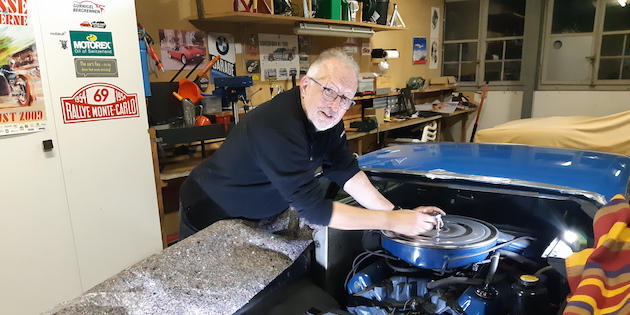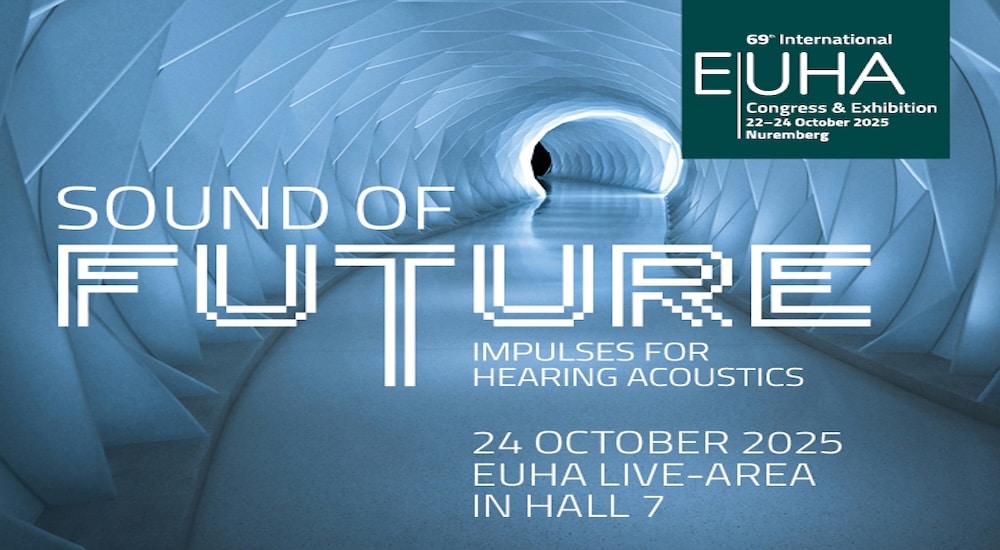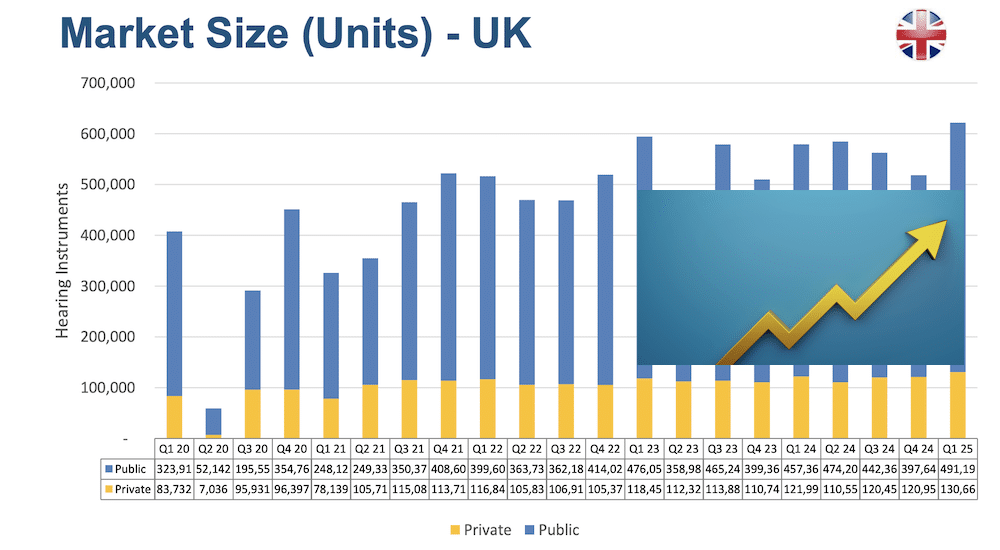Erich Spahr, pivot of Bernafon since 1984, waves Goodbye to a "people business"
brands
"You don't sound like you're retiring," I had to say, halfway through an hour-long chat with Erich Spahr, who confirms he is severing ties completely with an industry after a long career breathing life into it. This lynchpin of Bernafon since 1984 still seems clearly focused on the present and the future.

By Peter Wix, editor-in-chief
But Perhaps thirty-seven years and six months is still not long enough in a job for the person retiring from it to deliver wistful recollections from a Proustian distance.
"The funny thing is it went so fast," he laughs. "Thirty-seven years sounds like a long time but there were always new things happening, new things coming in, new challenges to overcome; for me it's about a dramatic change in what at least felt like a very short time."
So, he retires still thinking about everything going on around him, thinking under several hats not hung up on the exit rack until September 30, 2021: Erich Spahr, General Manager for Bernafon in Switzerland, and SVP in Demant, heading three hearing aid brands, Bernafon, Sonic and Philips.
The 1980s
Erich Spahr's story in the hearing aid industry began as digitalisation brought new opportunities and ended time-honoured ways of working and looking at things. Our protagonist was both its victim and its beneficiary. Seismic change in the graphic arts was sweeping away old skills on a river of ones and zeros, dragging along protesting old-style print specialists, the inky-fingered manipulators of monotype and linotype. Erich, at the start of the 1980s, was a typesetter, working by hand, "the way Mr. Guttenberg did it, and then of course this industry was blown away by digitalisation."
But the widespread arrival of computer technology meant a new environment for this graphics man, who changed the smoky ground floors of noisy print machinery—via the offices of the art department of a women's magazine, pret-a-porter and all—for a job with a telecommunications group, Gfeller. Since 1946, this firm had been steadily working in the pioneer territory of sound amplification devices for the hard of hearing, among whom was the founder himself, Hans Gfeller Sr.
What Gfeller and his son Hans Jr. built was to have a big impact on the future industry as the company changed via mergers and buyouts, even bringing Maico US to its later marriage with Demant, as well as the audiological department of Robert Bosch in Germany, "so this was basically the trigger for Demant being number one today in diagnostics," Spahr underlines.
Walls fell, gold glistened, icons mingled
"When I started out in 1984 we had a really high-end product with four mechanical trimmers, and the speciality was that we did not have the usual trimmers but small cylindrical wheels with values printed on them, where you could see what you were adjusting when using the screwdriver—highs and lows—and then you could of course read this, and that was new. The instruments were called the T-series, and at that time the fight was about how many mechanical trimmers you brought on a hearing aid," explains the man then taking over for Gfeller what "was then called advertising, not marketing".
By 1987, Gfeller had merged to become part of Ascom, and Spahr was preparing to take on his first big project for the 1988 launch at EUHA of a genuine high jumper in hearing technology, a programmable system called Phox, consisting of a hearing aid programmed through a cable connected to a programming unit. His campaign was global from day one. "The interest was huge; this was really a breakthrough, because suddenly you had up to twelve parameters you could adjust," he recalled.
During this time the sparks of competition flew in all directions, and Erich Spahr too, in the days of the "fun brand" Rexton—"they had the nicest booths in a black and gold John Player design, and the biggest cars outside"—and enjoying the frisson of conference downtime shoulder-rubbing with figures he now recalls: industry icon Paul Bommer, founder of Rexton, Phonak's Andreas (Andy) Rihs and brother Hans-Ueli; and Starkey's legendary founder, Bill Austin.
Erich's journey veered east with the political changes that brought about the fall of the Berlin Wall in 1989. ˝We suddenly saw opportunities to go gold digging, searching for the right people to build connections into these markets. I remember when we went to the eastern part of Germany three weeks after we were able to go, we felt that would be our springboard into Soviet Union states," he recalls.
Technology – advancement but always with fears and concerns
"What I have seen in this industry in the last 37 years is just mind-blowing when I think about it," affirms Spahr, who at the start of his hearing industry career would use telex to contact his customers, moving to telefax, which "seemed quite modern". "Slowly we got desktop computers and had our first word processing stuff."
The early breakthrough that Spahr helped steer with the Phox system highlights the opportunities provided by new tech. Here was something with 12 parameters, pre-set programmes, and auto-select mode for keying in the audiogram, with the patient's hearing loss input on five separate frequencies, "everything done automatically. That was a big trigger for the whole industry to move in this direction, and they all came up with their own solutions, which they were probably already working on, but we were just out on the market really fast, and as a small supplier basically shocked the market," he points out.
But opportunities are rarely free of negatives, as Spahr knew well from his own experience in losing his job through new print technology. Professionals then fear for their jobs. "It was a big discussion at the time that we, with our speicalised computers, or programming units as we called them, would take away jobs from the hearing care professional (HCP)," he explains.
Over-the-counter
Such fears appeared at many junctures of Spahr's career, and continue today. "Over and over we heard it from the HCPs. We heard it when the World Wide Web was suddenly around, and there were discussions about there being someone in an office who could programme through the internet, could order through the internet. Also at that time people felt the industry could completely change, but it didn't!" he affirms.
These same fears now face the industry again through the threat of over-the-counter (OTC) hearing aid sale. "I'm relatively relaxed about this whole discussion," he says, "because what I've learned over these 37 years, having seen all these start-ups with great ideas, and self-fitting hearing aids, and no specialists needed any more, most of them either disappeared or have been taken over by traditional hearing aid manufacturers."
Emphasising that millions of PSA and direct-to-consumer devices are "already sold in Japan, China, and US", Spahr is concerned about how this might play with people with some kind of hearing loss, who are still waiting too long—six years on average—to take the first step to finding a hearing solution. "The concern I have is that then such systems are bought, taken home, tried, then it doesn't work, put it away, and there is a good excuse to say 'I tried it, it doesn't work, so I don't need to go to the hearing care professional'. My strong belief is that a successful treatment of a hearing loss is like a tandem between the manufacturer and the hearing care professional, having the best technology and the expertise in counseling, fitting and motivating the hearing impaired person in a trusted partnership. And this will not change in the future."
The shadow of the tech giants
He remains sanguine too about fears that tech giants such as Apple could come in with their own highly advanced product. "This is a complex business, super complex. You sell a hearing aid and you have it returned because the customer has that choice. You need a huge service component, which I think is needed; you need a service organisation that can do repairs almost the same day, and I just don't see that this is an interesting business for Apple. And then deliver a medical class 2 product, with regulatory requirements just getting more and more crazy!" Spahr underlines.
Too much complexity for the user?
Recognising that consumers today are generally more informed and more critical, this industry stalwart strongly advocates that product should have an impact for the user, and that too much complexity overreaches this simple objective. "I experienced a time when elderly people were not good buyers. They were authority believers—you know, the man in the white coat—and today that has definitely changed," he says.
"And that's good because that's a very good motivation for HCPs to do a good job. But, on the other hand, I also see that we as an industry we are delivering features and possibilities that are often too complicated. For us it may be a good sales argument B2B, so a lot of these fantastic apps and gimmicks are a great story, but to explain that to an elderly person and how to use it, and what is the benefit of it, is relatively complex for the HCP, and very often the user is overloaded with all these possibilities."
Brands
Wearing different executive headwear throughout his days in Demant/Bernafon has called for all Spahr's dexterity in understanding brands. For many audiologists today, Bernafon might have a reputation as a second-tier, more entry-level hearing aid brand, a simplification this SVP carefully corrects. "I always say we want to be the Volkswagen of the industry: super product, very good price, reliable and you know what you get," Spahr auspiciously elucidates.
He recognises that in the multi-brand set-up within Demant—created in 1994 when William Demant Holding acquired Ascom Audiosys (Bernafon), and growing in 2011 when Sonic joined the group—"a clear strategy needed to be in place, defining the positioning and the mission in the market for each brand, so of course we don't primarily attack premium brands; we go for other value-for-money brands."Another operation requiring his skills in defining and nuancing is Demant's recent licensing deal with Philips to market the Danish group's product as Philips HearLink, not so much using the back story of Philips as a hearing aid manufacturer throughout the 1990s but decidedly as "a business opportunity for business partners who really understand the value of a trusted consumer brand, B2C."
"I always say a brand needs heart and soul and people who stand behind it; otherwise you can't live for long," he stresses. "You need this credibility and trust from the customers; there are people behind the brand who breathe life into the brand day and night, and I think, looking back, that's where we at Demant were good, and are good."
A people business
This focus on individuals at each stage of the go-to-market approach underlines a dynamic in the hearing business that Erich Spahr has happily embraced: "I still feel we are in the people business. Our customers deal every day with people, they want to deal with people so our frontline colleagues are super important for being successful in the market. Sales people do not only need to understand the sales process, but they are also supporters and partners of the hearing care professional."
In his B2B dealings, and in thinking about the colleagues with whom he has shared his time, Spahr again prefers to talk about a person-centred occupation. "We were always competitors but we were having a drink in the bar and were able to talk together as normal people. I just hope that this culture will not change completely going forward."
So this complete retirement is "a big step" for Erich. He is not intending to stay in touch with the industry. "I don't want to play the grey eminence. I did it full-hearted, then younger people will take over and they will do a good job."







